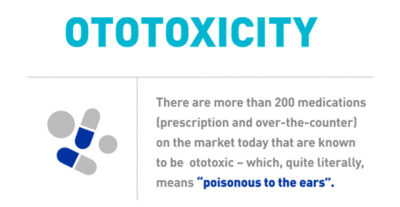Ototoxic Medications That Cause Hearing Loss
 Did you know that approximately 200 prescription and over-the-counter medications are known to be ototoxic, which literally means, “poisonous to the ears”? Ototoxic drugs have the potential to damage the inner ear or cause vestibular dysfunction, which can result in hearing loss, tinnitus or even balance disorders.
Did you know that approximately 200 prescription and over-the-counter medications are known to be ototoxic, which literally means, “poisonous to the ears”? Ototoxic drugs have the potential to damage the inner ear or cause vestibular dysfunction, which can result in hearing loss, tinnitus or even balance disorders.
Many ototoxic effects are temporary and go away once a medication is stopped, but some effects can be long term or even permanent.
Which medications are ototoxic?
Determining a drug’s affect on hearing is a long process, comprised of extensive scientific studies. This makes it difficult to compile a complete list, especially with newer medications. That said, many of the medications in use have been tested, and the list of known ototoxic drugs includes:
- Aspirin
- Quinine
- Loop diuretics (or “water pills”)
- Certain antibiotics
- Some anti-cancer drugs
- Some anesthetics
Symptoms of ototoxicity
If you’re taking a known or suspected ototoxic drug and begin to notice symptoms such as tinnitus, noticeable hearing loss or balance issues, talk to your ENT physician or audiologist right away. It’s important that you don’t stop any prescribed medications without first consulting your physician.
What can you do?
Unfortunately, there is no simple solution to preventing medication-related hearing loss. However, depending on each individual’s situation, certain preventative measures can be implemented. Even so, every ototoxic medication carries a risk.
- Before treating serious illnesses or medical conditions with medications that affect hearing, discuss the risks versus benefits with your healthcare professionals.
- Follow medication instructions carefully.
- Avoid taking multiple ototoxic drugs simultaneously, if possible (like aspirin and loop diuretics).
- When around environmental chemicals, ensure proper ventilation and minimize usage and exposure.
Get a hearing screening
Most importantly, before receiving treatment for any condition that involves known or suspected ototoxic drugs (both prescribed or over-the-counter), you should get a hearing screening with a hearing professional.
A pre-treatment hearing screening will set a baseline to measure against during the course of your treatment. Regular hearing tests throughout treatment can help detect any changes, which you can and should share with your healthcare professional.
You can read more about ototoxicity from the American Speech-Language-Hearing Association (ASHA).
If you’d like more information on the link between medications and hearing loss—or, simply want to come in for a free baseline hearing screening—North Fulton ENT Associates is here to help. Make your appointment by simply filling out our Online Form or call us at: (770) 450-6554.
